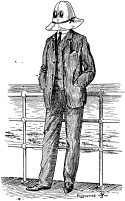Search us!
Search The Word Detective and our family of websites:
This is the easiest way to find a column on a particular word or phrase.
To search for a specific phrase, put it between quotation marks. (note: JavaScript must be turned on in your browser to view results.)
Ask a Question! Puzzled by Posh?
Confounded by Cattycorner?
Baffled by Balderdash?
Flummoxed by Flabbergast?
Perplexed by Pandemonium?
Nonplussed by... Nonplussed?
Annoyed by Alliteration?

Don't be shy!
Send in your question!
Columns from 1995 to 2006 are slowly being added to the above archives. For the moment, they can best be found by using the Search box at the top of this column.
 If you would like to be notified when each monthly update is posted here, sign up for our free email notification list.
If you would like to be notified when each monthly update is posted here, sign up for our free email notification list.
Trivia
All contents herein (except the illustrations, which are in the public domain) are Copyright © 1995-2020 Evan Morris & Kathy Wollard. Reproduction without written permission is prohibited, with the exception that teachers in public schools may duplicate and distribute the material here for classroom use.
Any typos found are yours to keep.
And remember, kids,
Semper Ubi Sub Ubi
|
Is that a new clipboard, Sir?
Dear Word Detective: I have always used the expression, “What are you souping me up?” or “I plan to soup him up.” In my neighborhood (Bronx, NY), this phrase meant to “butter someone up” (not necessarily lying to a person, but complimenting them, etc., so they would go along with you or do something you wanted them to do). Well, long story short, my son-in-law thinks I made this expression up and that it is not used by anyone but my family. I cannot find this expression anywhere for verification but know that I have heard this phrase used in movies, etc., and certainly by a large group of my friends and neighbors. I just need to prove this to my SIL and now my daughter who seems to believe her hubby on this matter. — Debra.
 Da noive of some people. Obviously, people making up words and phrases (especially slang) is far from rare, which is why we have so many words and phrases. But if there’s one thing I’ve learned in writing this column for the past gazillion years, it’s that strange words and phrases that the neighbors and in-laws have never heard are almost always “real,” well-established locutions, and frequently have histories going back hundreds of years. Da noive of some people. Obviously, people making up words and phrases (especially slang) is far from rare, which is why we have so many words and phrases. But if there’s one thing I’ve learned in writing this column for the past gazillion years, it’s that strange words and phrases that the neighbors and in-laws have never heard are almost always “real,” well-established locutions, and frequently have histories going back hundreds of years.
On the other hand, it is true that your use of “soup up” to mean “to flatter, to curry favor with” is not recorded by any of the dictionaries or glossaries of slang I own. “Soup” has many other uses in slang, from “in the soup” meaning “in big trouble” (probably by allusion to “in hot water”) to “soup” meaning “nitroglycerin,” “fog” or “photographic developer.” In fact, one of the most popular 20th century uses of “soup” in slang was “to soup up,” meaning to increase the power of a car’s engine, a phrase which was rooted in “soup” as old racetrack slang for stimulants surreptitiously injected into horses to make them run faster.
After searching exhaustively for some mention of the “butter up” sense of “soup up” you asked about, I finally thought to search the archives of the American Dialect Society mailing list (www.americandialect.org). Bingo (maybe). Last year, linguist Benjamin Zimmer posted to the list an article he had found on college slang from The Boston Globe in 1902. One of the phrases apparently then current was “souping,” with the example “A student who endeavors to get a high stand mark by favoritism is said to be ‘souping’ the professor….” That would certainly seem to fit with your “flatter” use of “soup up.”
Some participants on the ADS list wondered whether the 1902 reference might be akin to “wine and dine,” i.e., show a good time to someone in hopes of gaining favor. It was also suggested that “soup” in the quote might have just been a typographical error for “soap,” 19th century slang for “flatter” (as in “soft soap”).
But I think the 1902 citation is legit, and that the term “to soup up” meaning “to flatter” harks back to “soup” as slang for drugs given to race horses to make them perform better. After all, there’s no drug more powerful than flattery.
Drop a dime to meet the fishes.
Dear Word Detective: In February 1998 you answered a question on the origin of the British term “grass” meaning, roughly, “to snitch.” But where did the word “snitch,” which is much older, come from? The Oxford English Dictionary says it’s of unknown origin. Any thoughts on the word’s origin or on how it came to mean “grass”? — Jackie.
 Weird. Suddenly 1998 seems like a long, long time ago. It’s probably because that’s when we moved from New York City to rural Ohio, where time moves much more slowly. Incidentally, if anyone cares, I happen to know where all those 80s hairstyles ended up. Weird. Suddenly 1998 seems like a long, long time ago. It’s probably because that’s when we moved from New York City to rural Ohio, where time moves much more slowly. Incidentally, if anyone cares, I happen to know where all those 80s hairstyles ended up.
I presume that you found my column on “grass” in our online archive, but for the benefit of those not near a computer, here’s the short form. The use of “grass” as British slang for a police informer dates back to the 1930s, and is apparently a short form of the slang term “grasshopper,” meaning the same thing. “Grasshopper” itself is rhyming slang (“a secret language” in which words rhyme with a hidden meaning) for either “copper” (i.e., a police officer) or “shopper,” one who “shops” (sells) information to the police.
“Snitch” meaning “informer” is indeed an older word, dating back to the late 18th century. But the original meaning of “snitch” when it appeared a hundred years earlier was “a fillip on the nose,” a “fillip” being what we would today call a “flick” with one’s finger or a light, sudden slap of the hand. The actual origin of “snitch” is, as the OED says, unknown, but I would suspect an “echoic” origin, i.e., the word was intended to echo the action (and perhaps the sound) of a light, snapping tap on the schnozz. Such coinages are not uncommon. “Tap” and “slap,” for instance, are both of such “echoic” origins.
By about 1700, “snitch” had progressed from meaning “flick to the nose” to serving as slang for the nose itself (“As the … egg … broke on the ‘snitch’ of the Socialist candidate,” 1902), and this was the key development in the evolution of “snitch” as slang for “informer.” The nose has long been used as a symbol of intrusion into others’ business (e.g., a busybody is described as being “nosy”), and the image of a police dog or bloodhound “sniffing out” crime or tracking criminals has been a staple of popular culture for centuries. “Nose,” in fact, has been underworld slang for a spy or informer since the late 18th century (“The first issue of forged notes, it is stated by a nose (an informer), amounted to 500,” 1830). So using “snitch,” already slang for “the nose,” as slang for “an informer” would have been a natural development.
Something’s up in the underground.
Dear Word Detective: What is the origin of “skullduggery”? Is it related to grave robbing as in the 1800s for medical use of cadavers? Or is it much older? — Lyn Kin.
Ah, yes, body-snatching. The practice was so widespread in the 18th century that a device called the “mortsafe” was developed, a sort of iron cage that surrounded the coffin and prevented abduction of the occupant. Body-snatchers, who sold their product to medical schools, were known as “resurrectionists,” and some, such as the infamous team of William Burke and William Hare, were not above employing murder when the natural supply ran low.
 Those readers who made it past that cheery paragraph may have noticed that I let the spelling “skullduggery” (to which my spell-checker objects) stand in the question, because the combination of “skull” and “duggery” (which sounds like an archaic form of “digging”) certainly puts one in mind of grave-robbing. But the original and more common spelling is “skulduggery,” with just one “l,” and the term actually has no connection to either skulls or digging. Those readers who made it past that cheery paragraph may have noticed that I let the spelling “skullduggery” (to which my spell-checker objects) stand in the question, because the combination of “skull” and “duggery” (which sounds like an archaic form of “digging”) certainly puts one in mind of grave-robbing. But the original and more common spelling is “skulduggery,” with just one “l,” and the term actually has no connection to either skulls or digging.
“Skulduggery” today means “underhanded dealings,” “trickery” or “clandestine machinations.” The term is apparently an American invention, first appearing in print (as far as we know) in 1867 (“From Minnesota had been imported the mysterious term ‘scull-duggery’, used to signify political or other trickery.”), but since that quotation is an explanation of the term, we can assume it had been in use for some time before that. Today “sculduggery” is most often associated with cloak-and-dagger intelligence agencies such as the CIA, but freelancers and domestic political operatives have made their own splashes on occasion with “skulduggery” (“Watergate was such a sensational piece of skulduggery,” The Times (London), 1980).
While “skulduggery” may be a US coinage, its roots appear to lie in Scotland. The 18th century Scots term “sculduddery” meant “indecency” or “breach of chastity,” defined at the time as meaning specifically “fornication or adultery.” While “sculduddery” may at one time have been a serious legal term in Scotland, most written instances of the term treat it as jocular slang.
In any case, just how “skulduddery” in Scotland became “skulduggery” in the US is a mystery, although the terms do share obvious overtones of secrecy and impropriety. We also have no idea of what the roots of “sculduddery” might be. On the bright side, however, we do have “skulduggery,” a great word for those times when something underhanded is afoot.
|
Makes a great gift! Click cover for more.  
400+ pages of science questions answered and explained for kids -- and adults!
FROM ALTOIDS TO ZIMA, by Evan Morris
 
|
 Da noive of some people. Obviously, people making up words and phrases (especially slang) is far from rare, which is why we have so many words and phrases. But if there’s one thing I’ve learned in writing this column for the past gazillion years, it’s that strange words and phrases that the neighbors and in-laws have never heard are almost always “real,” well-established locutions, and frequently have histories going back hundreds of years.
Da noive of some people. Obviously, people making up words and phrases (especially slang) is far from rare, which is why we have so many words and phrases. But if there’s one thing I’ve learned in writing this column for the past gazillion years, it’s that strange words and phrases that the neighbors and in-laws have never heard are almost always “real,” well-established locutions, and frequently have histories going back hundreds of years.

 can be found
can be found 

 Those readers who made it past that cheery paragraph may have noticed that I let the spelling “skullduggery” (to which my spell-checker objects) stand in the question, because the combination of “skull” and “duggery” (which sounds like an archaic form of “digging”) certainly puts one in mind of grave-robbing. But the original and more common spelling is “skulduggery,” with just one “l,” and the term actually has no connection to either skulls or digging.
Those readers who made it past that cheery paragraph may have noticed that I let the spelling “skullduggery” (to which my spell-checker objects) stand in the question, because the combination of “skull” and “duggery” (which sounds like an archaic form of “digging”) certainly puts one in mind of grave-robbing. But the original and more common spelling is “skulduggery,” with just one “l,” and the term actually has no connection to either skulls or digging.



Recent Comments